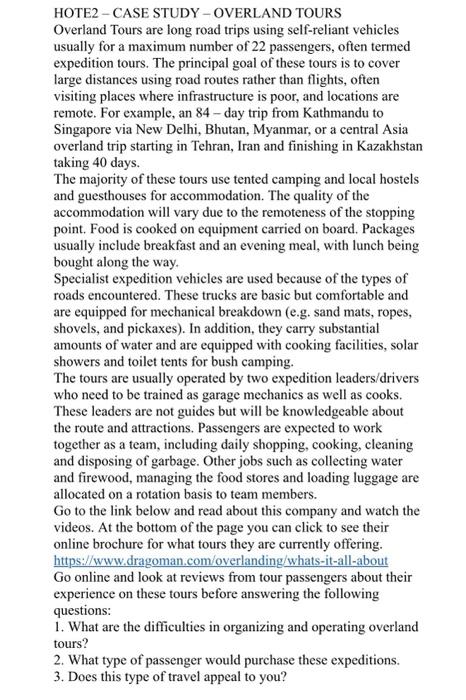HOTE2 - CASE STUDY - OVERLAND TOURS Overland Tours are long road trips using self-reliant vehicles usually for a maximum number of 22 passengers, often termed expedition tours. The principal goal of these tours is to cover large distances using road routes rather than flights, often visiting places where infrastructure is poor, and locations are remote. For example, an 84 - day trip from Kathmandu to Singapore via New Delhi, Bhutan, Myanmar, or a central Asia overland trip starting in Tehran, Iran and finishing in Kazakhstan taking 40 days. The majority of these tours use tented camping and local hostels and guesthouses for accommodation. The quality of the accommodation will vary due to the remoteness of the stopping point. Food is cooked on equipment carried on board. Packages usually include breakfast and an evening meal, with lunch being bought along the way. Specialist expedition vehicles are used because of the types of roads encountered. These trucks are basic but comfortable and are equipped for mechanical breakdown (e.g. sand mats, ropes, shovels, and pickaxes). In addition, they carry substantial amounts of water and are equipped with cooking facilities, solar showers and toilet tents for bush camping. The tours are usually operated by two expedition leaders/drivers who need to be trained as garage mechanics as well as cooks. These leaders are not guides but will be knowledgeable about the route and attractions. Passengers are expected to work together as a team, including daily shopping, cooking, cleaning and disposing of garbage. Other jobs such as collecting water and firewood, managing the food stores and loading luggage are allocated on a rotation basis to team members. Go to the link below and read about this company and watch the videos. At the bottom of the page you can click to see their online brochure for what tours they are currently offering. https://www.dragoman.com/overlanding/whats-it-all-about Go online and look at reviews from tour passengers about their experience on these tours before answering the following questions: 1. What are the difficulties in organizing and operating overland tours? 2. What type of passenger would purchase these expeditions. 3. Does this type of travel appeal to you







